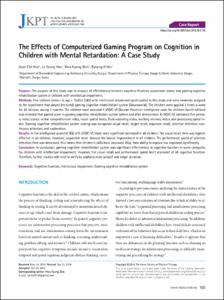KUMEL Repository
1. Journal Papers (연구논문)
1. School of Medicine (의과대학)
Dept. of Biomedical Engineering (의용공학과)
The Effects of Computerized Gaming Program on Cognition in Children with Mental Retardation: A Case Study
- Affiliated Author(s)
- 김선칠
- Alternative Author(s)
- Kim, Seon Chil
- Journal Title
- 대한물리치료학회지
- ISSN
- 2287-156X
- Issued Date
- 2018
- Abstract
- Purpose:
The purpose of this study was to analysis of effectiveness between cognitive function assessment scores and gaming cognitive rehabilitation system in children with intellectual impairment.
Methods:
Five children (male=5, age=10.00±0.80) with intellectual impairment participated in this study and were randomly assigned to the experiment that played (received) gaming cognitive rehabilitation system (Neuroworld). The children were applied 2 times a week for 30 minutes during 3 months. The children were assessed K-WSIC-VI (Korean-Wechsler intelligence scale for children-fourth edition) and recorded that gained score in gaming cognitive rehabilitation system before and after intervention. K-WSIC-VI contained five primary index scores: verbal comprehension index, visual spatial index, fluid reasoning index, working memory index, and processing speed index. Gaming cognitive rehabilitation system scoring was composed visual recall, target recall, sequence recall, selective attention, continuous attention, and exploration.
Results:
In the intelligence quotient (IQ) of K-WSIC-VI, there were significant increased in all children. The visual recall item was highest effective in all children. However, sequential recall showed the lowest improvement in all children. The performance speed of selective attention item was decreased, this means that children’s skills have improved. Also, their ability to explore has improved significantly.
Conclusion:
In conclusion, gaming cognitive rehabilitation system was significant effectiveness in cognitive function in some categories for children with intellectual impairment. However, the visual recall and performance speed don’t represent of all cognitive function. Therefore, further studies will need to verify by applying more subject and longer duration.
- Department
- Dept. of Biomedical Engineering (의용공학과)
- Publisher
- School of Medicine (의과대학)
- Citation
- Seon Chil Kim et al. (2018). The Effects of Computerized Gaming Program on Cognition in Children with Mental Retardation: A Case Study. 대한물리치료학회지, 30(5), 193–198. doi: 10.18857/jkpt.2018.30.5.193
- Type
- Article
- ISSN
- 2287-156X
- Appears in Collections:
- 1. School of Medicine (의과대학) > Dept. of Biomedical Engineering (의용공학과)
- 파일 목록
-
-
Download
 oak-2018-1802.pdf
기타 데이터 / 711.73 kB / Adobe PDF
oak-2018-1802.pdf
기타 데이터 / 711.73 kB / Adobe PDF
-
Items in Repository are protected by copyright, with all rights reserved, unless otherwise indicated.